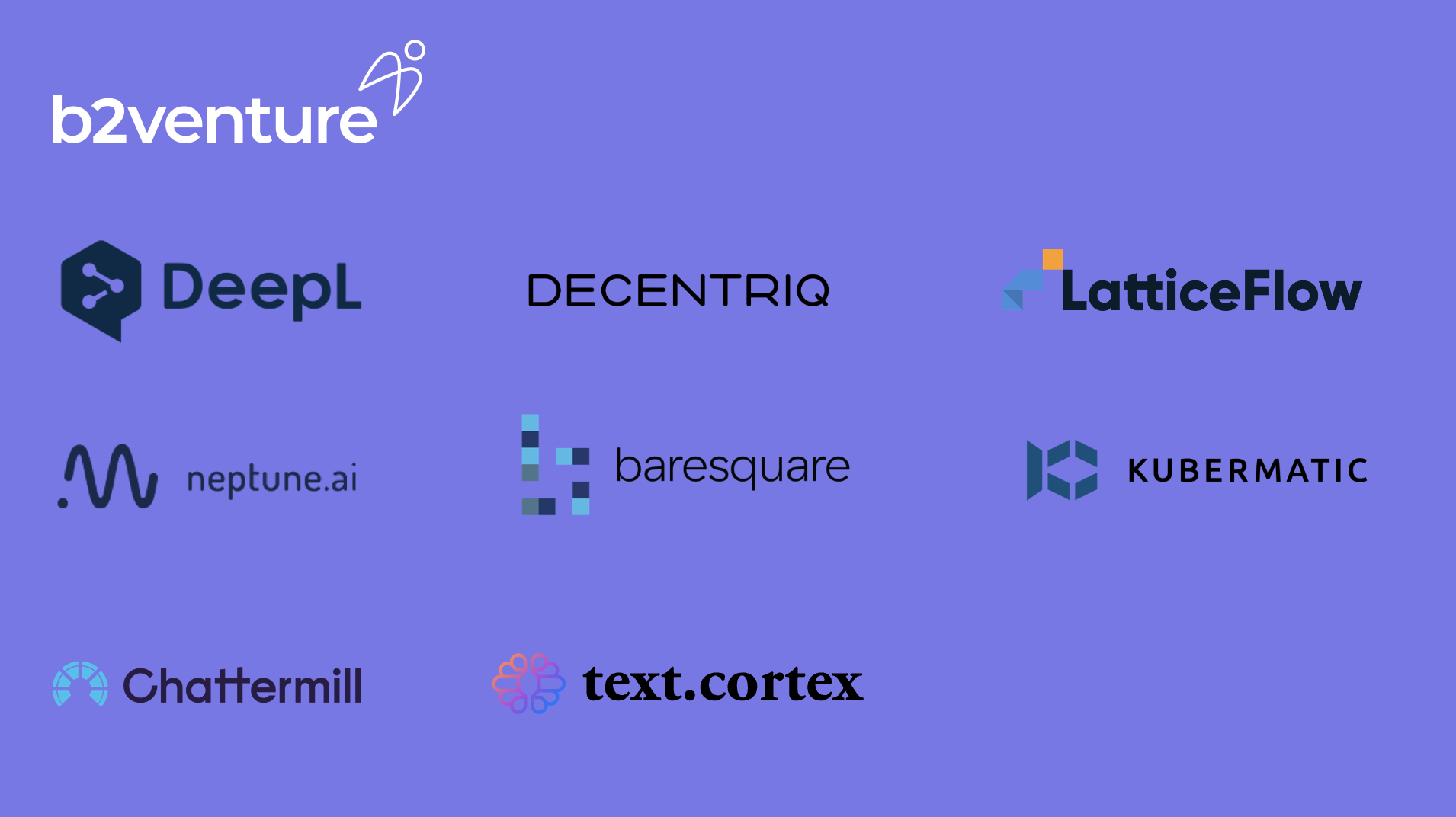Say Hello to Nicole Herzog - b2venture angel investor & entrepreneur
Say Hello to Nicole Herzog - b2venture angel investor & entrepreneur

Nicole says she never had a “masterplan” for her life. She was driven more by the question of “why not”?
Although she studied law at the University of St. Gallen, she never wanted to work as a lawyer and was drawn into the world of entrepreneurship while studying at university. “Working as a lawyer didn't feel like I was creating value.”
“There were no entrepreneurs in my family. My entrepreneurial spirit is likely the result of my childhood. I was a so-called latchkey kid and learned to be independent at an early age. The desire to shape my own path still drives me today.”
Nicole was one of the co-founders of b2venture, in its early years known as “BrainsToVentures”, which was in the beginning an online platform designed to match business angels with founders working on early-stage startup ideas.
“It was my first ‘why not’ decision,” says Nicole.
Brains-To-Ventures was founded in 2000 as a spin-off from START Global, a student-run organization at the University of St. Gallen, dedicated to fostering entrepreneurship and technological innovation and bringing together young students and experienced entrepreneurs and investors.
“To be honest, we were too early. There was no market for such a digital platform in the year 2000. And the bursting of the dot.com bubble did not help either. So, we had to pivot.” she says.

The company’s angel network was taken offline and became what is today b2venture, and the digital infrastructure became umantis, a HR and Talent management SaaS company that Nicole helped scale before selling to the Haufe Group in 2012.
“I took on a wide variety of responsibilities such as HR & Operations, finance, and even software development before settling into a COO role,” says Nicole.
For her it was totally natural to transition into becoming an angel investor after she sold umantis.
“I see myself as an entrepreneur, first and foremost, and I want to have an impact on the companies I invest in. I am not interested in entering at the later stages, I like to be involved early on.”
Nicole’s experience as an investor and board member has become one of her passions as well.
“It was another ‘why not’ moment: I had seen a lot and definitely wanted to help the next generation of founders. Startups that manage to grow up and become successful are our future,” says Nicole.
She collected a few thoughts about being a board member recently for LinkedIn, and she graciously allowed b2venture to publish them here:
1. You won't learn the challenges you encounter as a board member in start-ups in a training program, not even in an SME and even less in a corporate environment.
2. If it is your first start-up mandate, only do it if you have domain expertise and if there is someone on the board who has start-up experience (not the founders).
3. Make sure that all relevant skills are represented on the board.
4. The key to success are the founders: no matter what the bylaws say, you have to convince them, not outvote them.
5. Always ask and never take anything for granted. Sometimes the management team simply forgets to involve you. Most of the time it’s not intentional.
6. You are not just a board member, you are also a mentor and coach. Many founders are still young and have little leadership experience.
7. If things are going well, then get out of the way and support the founders. If things go south, don't panic, back them.
8. Always, and by always I really mean always - ensure the company has enough liquidity.
9. If you are worried about your professional reputation, don't join a board. The chances are good that the start-up will not be successful, despite your involvement.
10. If the start-up is a success, it will be the founders who are in the spotlight, not you.
It is the collaboration with angel investors such as Nicole which defines the b2venture approach. Thank you for your continued collaboration with us and our startup founders.
At b2venture we’ve worked with the most experienced members of our community of angel investors to put together this and other resources relating to company governance on our startup resources site. You’ll also find information on all the most important topics that founders need to understand and master when starting a company.

Nicole says she never had a “masterplan” for her life. She was driven more by the question of “why not”?
Although she studied law at the University of St. Gallen, she never wanted to work as a lawyer and was drawn into the world of entrepreneurship while studying at university. “Working as a lawyer didn't feel like I was creating value.”
“There were no entrepreneurs in my family. My entrepreneurial spirit is likely the result of my childhood. I was a so-called latchkey kid and learned to be independent at an early age. The desire to shape my own path still drives me today.”
Nicole was one of the co-founders of b2venture, in its early years known as “BrainsToVentures”, which was in the beginning an online platform designed to match business angels with founders working on early-stage startup ideas.
“It was my first ‘why not’ decision,” says Nicole.
Brains-To-Ventures was founded in 2000 as a spin-off from START Global, a student-run organization at the University of St. Gallen, dedicated to fostering entrepreneurship and technological innovation and bringing together young students and experienced entrepreneurs and investors.
“To be honest, we were too early. There was no market for such a digital platform in the year 2000. And the bursting of the dot.com bubble did not help either. So, we had to pivot.” she says.

The company’s angel network was taken offline and became what is today b2venture, and the digital infrastructure became umantis, a HR and Talent management SaaS company that Nicole helped scale before selling to the Haufe Group in 2012.
“I took on a wide variety of responsibilities such as HR & Operations, finance, and even software development before settling into a COO role,” says Nicole.
For her it was totally natural to transition into becoming an angel investor after she sold umantis.
“I see myself as an entrepreneur, first and foremost, and I want to have an impact on the companies I invest in. I am not interested in entering at the later stages, I like to be involved early on.”
Nicole’s experience as an investor and board member has become one of her passions as well.
“It was another ‘why not’ moment: I had seen a lot and definitely wanted to help the next generation of founders. Startups that manage to grow up and become successful are our future,” says Nicole.
She collected a few thoughts about being a board member recently for LinkedIn, and she graciously allowed b2venture to publish them here:
1. You won't learn the challenges you encounter as a board member in start-ups in a training program, not even in an SME and even less in a corporate environment.
2. If it is your first start-up mandate, only do it if you have domain expertise and if there is someone on the board who has start-up experience (not the founders).
3. Make sure that all relevant skills are represented on the board.
4. The key to success are the founders: no matter what the bylaws say, you have to convince them, not outvote them.
5. Always ask and never take anything for granted. Sometimes the management team simply forgets to involve you. Most of the time it’s not intentional.
6. You are not just a board member, you are also a mentor and coach. Many founders are still young and have little leadership experience.
7. If things are going well, then get out of the way and support the founders. If things go south, don't panic, back them.
8. Always, and by always I really mean always - ensure the company has enough liquidity.
9. If you are worried about your professional reputation, don't join a board. The chances are good that the start-up will not be successful, despite your involvement.
10. If the start-up is a success, it will be the founders who are in the spotlight, not you.
It is the collaboration with angel investors such as Nicole which defines the b2venture approach. Thank you for your continued collaboration with us and our startup founders.
At b2venture we’ve worked with the most experienced members of our community of angel investors to put together this and other resources relating to company governance on our startup resources site. You’ll also find information on all the most important topics that founders need to understand and master when starting a company.

The Author
Team







.jpg)












.png)




.jpg)
-min.png)


.jpg)













































.jpg)





















